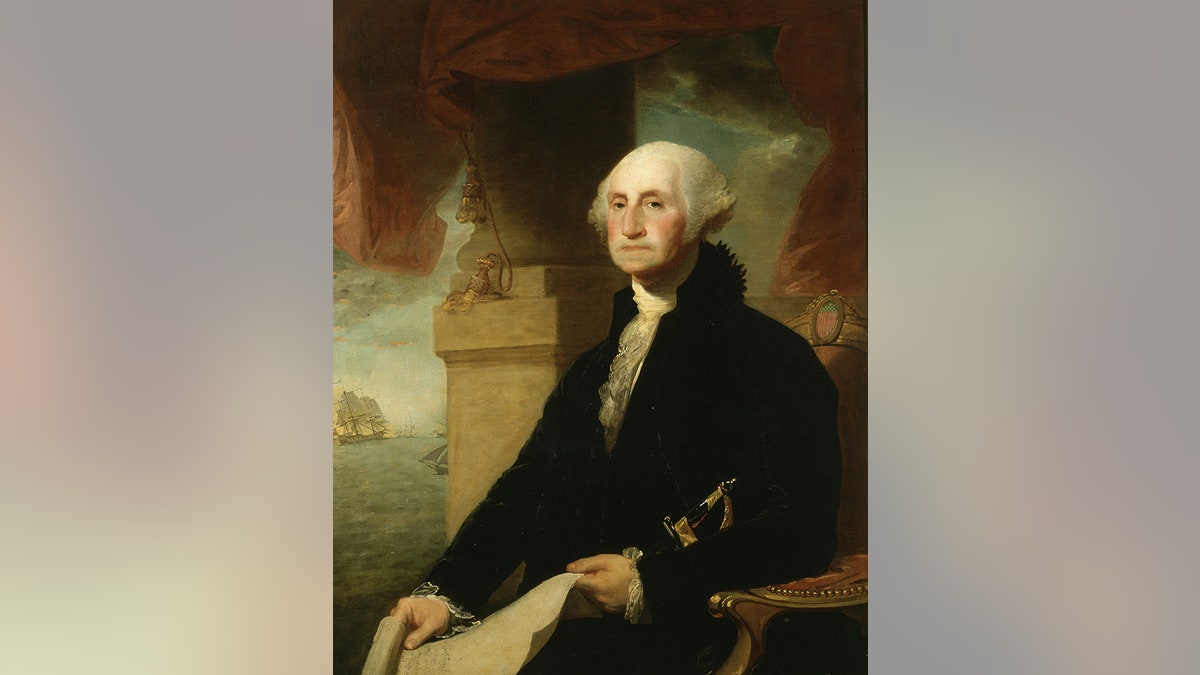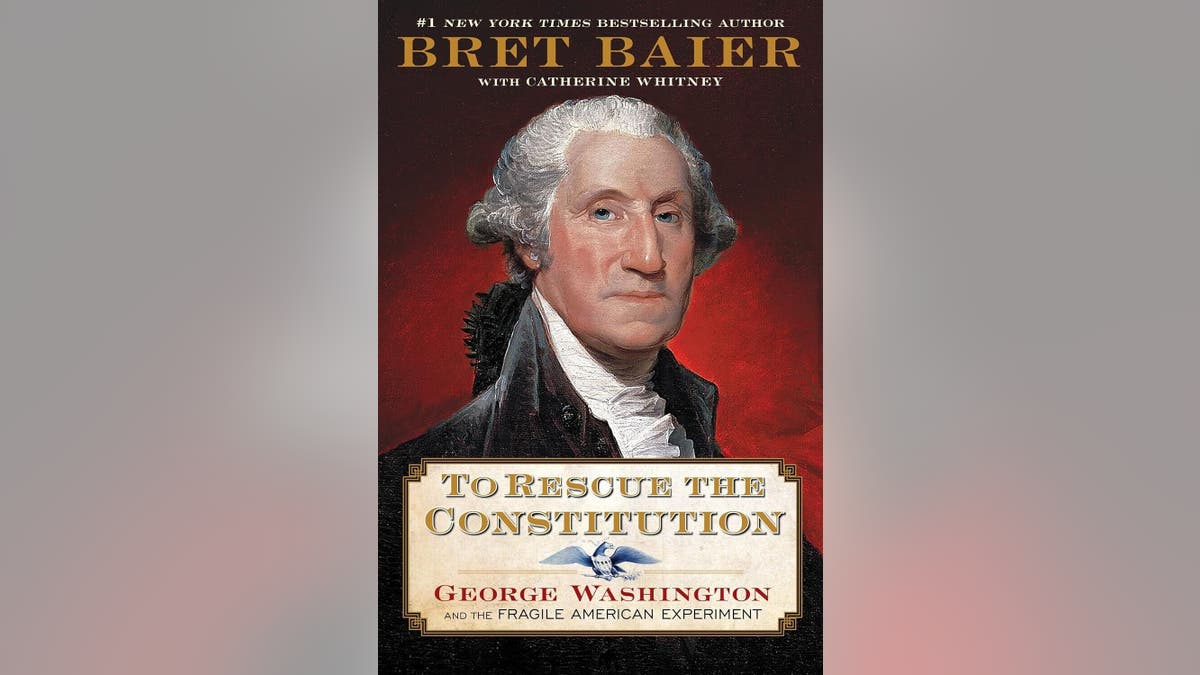NEWYou can now listen to Fox News articles!
PROGRAMMING ALERTS: Watch Bret Baier host “Special Report” live on Capitol Hill on Monday, October 9 at 6 p.m. ET on Fox News Channel. The show will feature special coverage on both the House speaker debate and reports on the war in Israel.
Be sure to catch the Fox Nation special ‘To Rescue the Constitution.’ The special, hosted by Bret Baier, dramatically reveals the life of George Washington, the Founder who did more than perhaps any other individual to secure the future of the United States.
On September 15, 1787, as delegates to the Constitutional Convention prepared to sign the new Constitution, Edmund Randolph, a delegate from Virginia, rose to announce that he could not sign the document unless it contained amendments. George Mason, also from Virginia, and Elbridge Gerry of Massachusetts followed, making their own statements of refusal. These men had been deeply engaged throughout the convention, and now they were turning their backs on the result.
For George Washington, the president of the convention, each defection came as a blow, but none more than that of George Mason, his neighbor and close friend. Mason had been by his side since the early days. Long before a revolution was imagined, the two men would sit together and discuss the issues of the day, including the frustrations of having a capricious ruler across the ocean.
Now he accused Washington and the others of “fixing an Aristocracy,” which he deemed even worse than a monarchy. How could Mason, who knew Washington’s heart better than almost anyone, imagine such a corrupt intent?
HOUSE REPUBLICANS TO HOLD CONFERENCE MEETING ON COLUMBUS DAY AMID SPEAKER FIGHT
It wasn’t that their insistence on a bill of rights was off base. There would be a bill of rights—just not yet. Washington had agreed with James Madison that it was best to get the main Constitution signed and out to the states for ratification, and to fight the battle over which items would be in amendments later.
Madison didn’t believe the convention delegates could withstand another controversy. As it would turn out, the influence of the small group of passionate outliers would spread and ultimately lead some states to make the passage of a bill of rights in the new Congress a condition of ratification. But that didn’t make it easier for Washington to accept that the signatures of two prominent fellow Virginians were not on the document that they had expended so much to create.
Eventually Randolph came around during the ratification process, but Mason only grew more incendiary, as one of the most outspoken critics of President Washington during his first term in office. He never stopped believing that the presidency itself was tainted by the same corruption as the monarchy. The two men never mended their relationship.
Ever since the founding of our country there have been small groups of passionate rebels rocking the status quo. They’re given free rein and even admired because that’s the freedom we guarantee. It isn’t only majorities that rule.
WHAT MY INTERVIEW WITH SAUDI CROWN PRINCE MOHAMMED BIN SALMAN REVEALS ABOUT THE POWER OF DEMOCRACY
I thought about this as I watched a group of eight Republicans voting against the majority in their conference to bring down Speaker of the House Kevin McCarthy—the first such ouster of a speaker in our nation’s history. While technically the eight naysayers were abetted by Democrats, the real point was their influence within their conference, and the fact that one of them, Florida Republican Rep. Matt Gaetz had introduced the motion to vacate that forced the vote. Many Republicans were stunned by how quickly it all happened, fearing the resulting chaos that seemed to be threatening constantly in recent months.
The fragile balancing act that keeps our government going has been much on my mind lately with the release of my new book, “To Rescue the Constitution: George Washington and the Fragile American Experiment.” There were many instances when the entire experiment was on the brink of disaster, and many others when small groups of dissenters captured the attention of the people and threatened to derail the hard work of the Framers.
Washington called partisanship a threat to our unity, leading to excess and “a spirit of mischief.” He called it “a fire not to be quenched, it demands a uniform vigilance to prevent it bursting into a flame, lest instead of warming it should consume.”
Those expressing shock over the brutal takedown of McCarthy should know that this kind of dissent has always been with us. Those in the majority want to demonize the rebels and even expel them, but they’re part of our fabric as well.
However, that brings us to a discussion of leadership. Rebels are allowed, but they’re not necessarily the people to lead. George Washington, a masterful leader who understood the complexities of that mantle, believed that the mandate of leadership in our democracy was to find compromises that strengthened the union.
Taking an immutable stance on an issue did not further the goals of the nation. I can guess what the man who fought so hard to form this country would have said about the drive to shut down the government. I think he would have asked, “to what end?” Actions required a purpose.
CLICK HERE FOR MORE FOX NEWS OPINION
Washington would have been disappointed by the partisanship exhibited by Democrats voting as a block against McCarthy, even though they knew the result would be chaos.

George Washington, portrait painting by Constable-Hamilton, 1794, from the New York Public Library. (Smith Collection/Gado/Getty Images)
In his farewell address, which is so revered that it is read aloud in the Senate every year on his birthday, Washington issued a warning about the danger of partisanship. This was just as political parties were being formed for the first time.
Washington called partisanship a threat to our unity, leading to excess and “a spirit of mischief.” He called it “a fire not to be quenched, it demands a uniform vigilance to prevent it bursting into a flame, lest instead of warming it should consume.”
CLICK HERE TO GET THE FOX NEWS APP
Signs of this are all around us these days. Perhaps the best thing Congress could do as it chooses a new speaker is to set aside the mentality of the partisan rebels and reach for unity.
It’s what George Washington would have advised.
CLICK HERE FOR MORE FROM BRET BAIER
Credit: Source link




